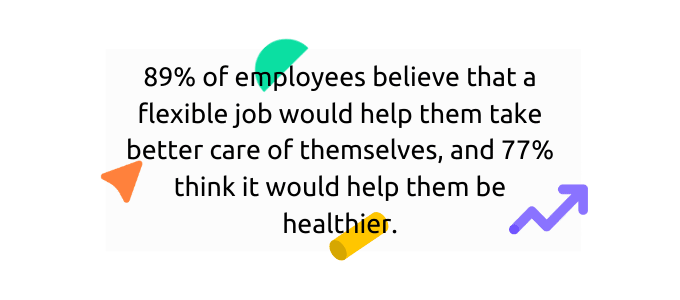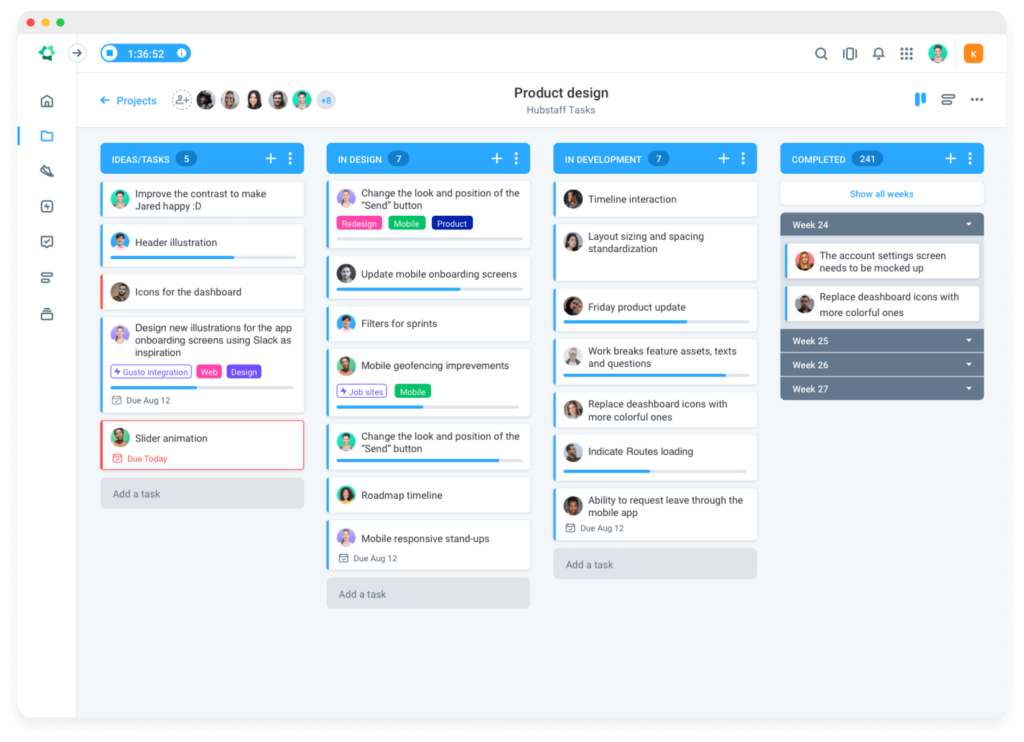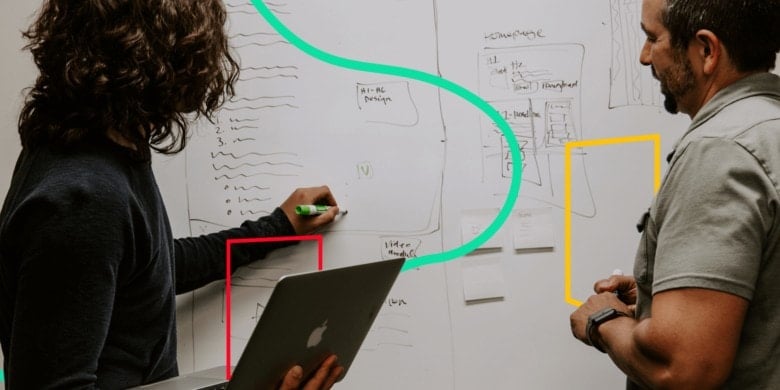Are you currently working as a project manager or aspiring to become one? Perhaps you’re curious about some examples of project management skills that will contribute to your success in this role.
To excel as a project manager, you have to wear many hats. The multifaceted role encompasses leadership, time management, communication, and problem-solving. This crucial blend of skills makes project manager an indispensable position for any project or organization.
Whether you’re spearheading a small team or orchestrating a large-scale project, a project manager’s ability to effectively plan, execute, and deliver hinges on possessing a diverse range of project management skills.
In this in-depth exploration, we will delve into various examples of project management skills that professionals should cultivate to excel in their roles. Let’s dive into each of these skills to understand how they can improve the chances of project success.
Boost your team’s efficiency with Hubstaff's productivity tools
Leadership skills
Project managers are not just supervisors. They’re catalysts for effective leadership. As a project manager, you’ll inspire teams, foster collaboration, and create an environment where each team member feels motivated to give their best. Your leadership style sets the tone for the entire project.
Project management skills in leadership go beyond just directing a team, though. It also involves inspiring individuals to work together towards a common goal. To succeed as a leader in project management, you should possess the following skills:

1. Visionary thinking
To be a successful project manager, you must articulate a compelling vision for the project’s success. You must communicate this vision to the team, aligning everyone with a shared sense of purpose and direction.
2. Motivational skills
A project manager’s ability to motivate and inspire team members is crucial. Motivation can come in various forms, like:
- Acknowledging achievements
- Sharing constructive feedback
- Creating a positive work environment
- Providing flexibility
As a project manager, you must encourage creativity, experimentation, and continuous improvement within your teams. You should foster a culture of innovation, facilitate brainstorming sessions, and provide resources and support for exploring new ideas and approaches.
3. Decision-making
Project leaders must make informed, timely decisions. Decisiveness is a key leadership trait, ensuring that the project stays on track and potential issues are addressed promptly. Most importantly, decision-making needs to be ethical. That means ensuring all decisions are fair, transparent, and aligned with ethical principles and organizational values.
4. Delegation
Effective delegation is essential for distributing responsibilities among team members. A good leader recognizes individual strengths and assigns tasks accordingly, maximizing the team’s overall efficiency.
5. Critical thinking
Critical thinking is a vital project management skill that allows project managers to analyze information, evaluate alternatives, and make sound decisions based on evidence and logic. Talented project managers must assess complex situations, identify patterns, and anticipate potential outcomes to effectively navigate project challenges and uncertainties.
6. Research
Research is a vital skill in project management, as it helps project managers make informed decisions when defining project scope. Whether analyzing successful past projects or exploring alternative methodologies, project managers rely on research to gather valuable insights and ensure project success. This ability to find and utilize new and relevant information is essential for effective project planning and execution.
7. Team development
The ability to nurture and develop high-performing teams is an important skill to have as a project manager. Project managers will need to get the most out of their team by:
- Identifying individual strengths
- Providing opportunities for growth and development
- Fostering a culture of collaboration
- Promoting accountability and continuous improvement
By investing in the professional development of team members, you can enhance team cohesion and productivity.
8. Collaborative leadership
Collaborative leadership is essential for successful project management. As a project manager, you should foster a collaborative project management environment where team members are empowered to contribute their expertise, ideas, and perspectives. By leveraging the collective intelligence and creativity of the team, you can generate innovative solutions, build consensus, and achieve project management success.
That said, part of good leadership is collective accountability which means you’ll need to look inward to make improvements, too.
9. Continuous improvement
Embracing a culture of continuous improvement is fundamental to effective project management. Project managers must continuously assess their project management skills, processes, and outcomes and seek opportunities for optimization and refinement.
By soliciting feedback, analyzing performance data, and implementing lessons learned from previous projects, project managers can improve processes. This can then lead to enhanced project efficiency, effectiveness, and overall project management maturity.
Communication and people skills
Communication and people skills are the lifeblood of project management. Clear and effective communication enhances collaboration and minimizes misunderstandings. A project manager with strong communication skills excels in the following areas.

10. Client relationship management
For client-facing projects, strong project management skills in client relationship management are crucial. To be successful in project management, you must effectively communicate with clients, manage expectations, address concerns, and ensure that deliverables meet or exceed client requirements and satisfaction.
11. Networking
Networking is an important project management skill that involves building and maintaining professional relationships with peers, industry experts, and stakeholders. Project managers must cultivate a strong network of contacts, attend industry events, and participate in professional organizations to stay informed. This also helps them keep up with industry trends, best practices, and opportunities for collaboration and learning.
13. Emotional intelligence
High emotional intelligence is a vital aspect of project management, enabling project managers to understand and manage their emotions and those of others effectively. Project managers with high emotional intelligence can build strong relationships, demonstrate empathy, and navigate conflicts with sensitivity and diplomacy to foster a positive project environment.
12. Active listening
As a project manager, you must actively listen to project team members, project stakeholders, and clients. This fosters a collaborative environment where ideas are heard and concerns are addressed promptly.
13. Clear articulation
Another people skill that is crucial in the realm of project management is the ability to articulate ideas, expectations, and project goals clearly is paramount. This skill ensures that all project team members understand their roles and responsibilities, contributing to a cohesive and informed team.
14. Documentation
Written communication is often formalized through documentation. As a project manager, you should be adept at creating clear and comprehensive project plans, status reports, and other relevant documents to keep all stakeholders informed.
15. Presentation skills
The best project managers frequently present project updates, plans, and outcomes to various audiences. Strong presentation skills are essential for conveying information persuasively and maintaining stakeholder engagement.
16. Feedback mechanisms
Establishing effective feedback mechanisms ensures continuous improvement. As a project manager, you should encourage open communication and welcome feedback from team members and stakeholders to refine project processes.
17. Vendor management
In the realm of project management, success hinges not only on internal coordination but also on effective collaboration with external partners and vendors. Whether it’s procuring resources, outsourcing tasks, or collaborating with specialized service providers, strong vendor management skills can significantly impact project outcomes.
Organizational and time management skills
Time is a critical resource in project management, and effective time management is essential for meeting deadlines and achieving project goals. To be a skilled project manager, you must excel in the following time management practices.
18. Tracking project performance
Monitoring and evaluating project performance are essential project management skills for assessing progress, identifying areas for improvement, and ensuring alignment with project goals. You should establish key performance indicators (KPIs), track project metrics, analyze performance data, and conduct regular project reviews.
If tracking project performance isn’t your strong suit, project cost management tools like Hubstaff can help you:
- Establish project benchmarks
- See real-time project spend
- Track time to tasks and projects
- Pull detailed reports to share with key stakeholders

19. Prioritization
Not all tasks are of equal importance. As a project manager, you should prioritize tasks based on their impact on project objectives, ensuring that critical activities receive the necessary attention and resources.
20. Adaptability
While planning is crucial, it’s equally important for project managers to be adaptable when unforeseen circumstances arise. Adapting to changes in project scope, unexpected delays, or evolving priorities requires a flexible mindset. To be a successful project manager, you need to stay Agile (pun intended) and adjust project plans as needed without sacrificing the overall project objectives.
21. Monitoring and control
Regularly monitoring project progress is essential for effective time management. As a project manager, you must employ various tools and techniques to track project milestones, identify potential delays, and implement corrective measures to keep the project on schedule.
22. Time estimation
Accurate time estimation is a key skill in project management. As a project manager, you must be able to assess the time required for each task. That means considering factors such as complexity, resources, and potential risks. This skill contributes to the creation of realistic project timelines. A reliable time tracking software can help you stay on track.
Risk management
Another important component of your project management skills toolbox is risk management. As a project manager, you must navigate the inherent uncertainties in projects by proactively managing risks. This involves identifying, assessing, and mitigating risks to safeguard project outcomes. Key components of effective risk management include:
23. Risk identification
To be a successful project manager, you must have a keen ability to identify potential risks early in the project lifecycle. This involves analyzing project requirements, stakeholder expectations, and external factors that could impact project success.
24. Risk assessment
Once identified, risks must be assessed in terms of their likelihood and potential impact. As a project manager, you must use qualitative and quantitative methods to prioritize risks and focus mitigation efforts on the most critical ones.
25. Mitigation strategies
Developing effective mitigation strategies is essential for minimizing the impact of identified risks. As a project manager, you must work with your teams to devise contingency plans, alternative approaches, or preventive measures to address potential issues.
26. Risk monitoring
Ongoing monitoring of identified risks is crucial throughout the project. To be successful in project management, you must continuously assess the status of risks, track changes in risk factors, and update mitigation strategies as needed to ensure proactive risk management.
27. Risk communication
Transparent communication about identified risks and mitigation strategies is vital for project success. Project managers keep stakeholders informed, fostering trust and ensuring a collaborative approach to addressing potential challenges.
Adaptability
The ability to adapt is a hallmark of an effective project manager. Projects are dynamic, and unforeseen changes can arise at any stage. Adaptability is one of the key project management skills to possess in 2024, including the following:

28. Flexibility
As a project manager, part of developing your project management skills includes embracing change and remaining flexible in your approach. You understand that project plans may need adjustments and are prepared to modify strategies to accommodate evolving project requirements.
29. Crisis management
Effective project management skills are evident in times of crisis or unforeseen challenges. Project managers must remain calm, decisive, and resourceful. They’ll need to establish contingency plans, mobilize resources, and lead the team through adversity while minimizing disruption to project timelines and objectives.
30. Problem-solving
When challenges arise, project managers engage in proactive problem-solving. This involves analyzing the root causes of issues, collaborating with the team to explore solutions, and implementing changes to keep the project on track.
31. Change management
Managing changes effectively is a key aspect of adaptability. Effective project management skills in this area involve guiding teams through transitions, communicating changes transparently, and mitigating resistance to change. By facilitating smooth transitions and ensuring that project stakeholders adapt seamlessly to evolving circumstances, project managers can maintain project momentum and achieve desired outcomes.
Negotiation skills
Negotiation is an essential skill for project managers as they navigate interactions with various stakeholders, team members, and external partners. Key elements of effective negotiation include:
32. Stakeholder alignment
Project managers negotiate with stakeholders to ensure alignment on project objectives, expectations, and deliverables. Clear communication and compromise are vital for building strong relationships with stakeholders.
33. Conflict resolution
Conflicts can arise within the project team or with external parties. Project managers must use negotiation skills to resolve conflicts diplomatically, find mutually beneficial solutions, and maintain a positive working environment. By fostering open communication, promoting understanding, and facilitating compromise, project managers can maintain a positive working environment and keep the project on track.
34. Contract negotiation
For projects involving external vendors or contractors, project managers negotiate contracts to ensure favorable terms, deliverables, and timelines. Clear agreements contribute to successful project collaborations.
35. Scope negotiation
The project scope may evolve during the project lifecycle. Project managers must negotiate changes to the scope with stakeholders, considering the impact on timelines, budgets, and overall project objectives.
Technical proficiency
To develop project management skills, depending on the nature of the project, project managers need to stay abreast of recent technology. This means technical skills in specific tools, software, or industry-specific knowledge. Key aspects of technical skills in project management include:

36. Project management software
To be successful in project management, project managers must use various project management tools to plan, track, and collaborate on projects. Project management skills with this type of software are essential. They facilitate efficient task organization, resource allocation, and communication among team members, stakeholders, and clients. Project management software also enables real-time tracking of progress, key performance indicators, and risk management, fostering informed decision-making and timely interventions.
37. Collaboration tools
Effective project managers often rely on collaboration and communication tools in addition to project management tools. Some technical skills and tools that project managers and project teams should use in this area include diagramming platforms, communication apps, and file-sharing systems to streamline team interactions.
38. Industry-specific knowledge
In certain fields, project managers benefit from a deep understanding of technical skills in industry-specific technologies, processes, and regulations. This knowledge enables them to make informed decisions and address project challenges more effectively.
39. Data analysis
There are many project management skills that can be developed in the technical realm. Alongside your typical project management tools, another important skill is analyzing data to inform decision-making. Proficiency in data analysis tools allows them to derive insights, identify trends, and make data-driven decisions for project improvement.
40. Emerging technologies
Staying abreast of emerging technologies, whether it’s project management tools or developments in their particular industry, is crucial for successful project management. The best project managers have a proactive approach to learning new technical skills and can leverage innovations to enhance project outcomes.
41. Agile project management
Agile project management methodologies are another important aspect of using project management tools. These tools are essential for adapting to changing project management landscapes and delivering value in dynamic environments. Project managers must adopt Agile principles and practices to their project management tools like:
- Iterative development
- Continuous feedback
- Adaptive planning
From there, they can then enhance project management flexibility, responsiveness, and customer satisfaction.
Budgeting and financial management
Financial oversight is a critical responsibility in project management, requiring skills in budgeting and financial management. Key components of this skill include:
42. Budget development
Project managers collaborate with relevant stakeholders to develop accurate project budgets. This involves estimating costs for resources, materials, labor, and other project-related expenses.
43. Expense monitoring
Ongoing monitoring of project expenditures ensures that the project stays within budgetary constraints. Project managers track costs, identify variances, and take corrective actions to prevent budget overruns.
44. Resource allocation
Efficient allocation of financial resources is essential for meeting project milestones. Project managers balance budget constraints with the need for optimal resource allocation, making strategic decisions to optimize project outcomes.
45. Financial reporting
Transparent reporting on project finances is crucial for stakeholders. To be successful in project management, you must provide regular reporting on:
- Project budgets
- Financial forecasts
- Benchmarking
- Accounting and invoicing
46. Cost-benefit analysis
Another key project management skill is conducting cost-benefit analyses to assess the financial viability of project decisions. This involves evaluating the potential return on investment and aligning project activities with overall business goals.
Quality management
Ensuring the quality of project deliverables is a fundamental responsibility in project management. Key elements of quality management include:
47. Establishing standards
To be successful in project management, project managers must define quality standards for project deliverables. This involves collaborating with stakeholders to understand expectations and setting benchmarks for quality.
48. Quality control measures
Implementation of quality control measures is essential for identifying and addressing defects or deviations from standards. Project managers must establish processes to monitor and control the quality of work throughout the project lifecycle.
49. Testing and validation
Depending on the project, testing and validation processes may be necessary to ensure that deliverables meet specified requirements. Project managers can then coordinate these activities to verify the quality of the final product.
50. Continuous monitoring
Quality management is an ongoing process. Project managers continuously monitor project activities, addressing any deviations from quality standards promptly to prevent downstream impacts on project success.
How to develop your project management skills
Enhancing your project management skills is a continuous journey that involves both practical experience and deliberate learning efforts. Below are some strategies to help you develop and refine your project management skills:
Formal education and certification
Pursuing formal education, such as a degree or certification in project management, provides a solid foundation in project management principles, methodologies, and best practices. Certifications like PMP (Project Management Professional) or PRINCE2 (Projects in Controlled Environments) are widely recognized and can boost your credentials in the field.
Hands-on experience
Actively seek opportunities to lead or participate in projects within your organization or community. Practical experience allows you to apply theoretical knowledge, develop problem-solving skills, and learn from real-world challenges. It’s also important to volunteer for new project roles, take on additional responsibilities in your current role, and seek mentorship from experienced project managers to accelerate your learning curve.
Continuous learning and professional development
Stay abreast of industry trends, emerging technologies, and evolving project management methodologies through continuous learning. Some ideas include:
- Attending workshops, seminars, and webinars
- Taking advantage of your company’s professional development budget to attend conferences
- Take an online course
- Listen to podcasts or read relevant books
Project management software
Familiarize yourself with project management software tools commonly used in the industry, such as Backlog, Asana, or Trello. Experiment with different tools to understand their features, functionalities, and how they can streamline project workflows. Practice using these tools to plan projects, track progress, manage resources, and collaborate with team members effectively.
Seek feedback
Solicit feedback on your project management performance from colleagues, stakeholders, and team members. Reflect on both successes and challenges encountered during projects. From there, you can then identify areas for improvement and share lessons learned with your peers. Then, incorporate feedback into your practice, refine your approaches, and continuously strive for growth and excellence in project management.
Join professional associations and networking groups
Participate in professional associations and networking groups dedicated to project management, such as the Project Management Institute (PMI) or local project management chapters. Engaging with peers in the industry allows you to exchange ideas, share experiences, and gain valuable insights into best practices and emerging trends. Collaborate on projects, attend workshops, and contribute to the project management community to broaden your knowledge and professional network.
Final thoughts
By proactively engaging in these strategies, you can develop and strengthen your project management skills. This then helps you become a more effective and successful project manager. Remember that mastery in project management is a journey of continuous improvement and lifelong learning.
Success in project management goes beyond the ability to create plans. It hinges on the capacity to lead, communicate effectively, adapt to change, and collaborate with diverse stakeholders.
As the project management field continues to evolve, staying abreast of emerging trends, technologies, and best practices is essential. By cultivating and mastering project management skills, professionals can position themselves as effective leaders capable of steering projects to success, meeting stakeholder expectations, and contributing positively to the overall success of their organizations.
Most popular
The Critical Role of Employee Monitoring and Workplace Security
Why do we need employee monitoring and workplace security? Companies had to adapt fast when the world shifted to remote work...
15 Ways to Use AI in the Workforce
Whether through AI-powered project management, strategic planning, or simply automating simple admin work, we’ve seen a dramatic...
The AI Productivity Panel: Lessons From Leaders on What’s Working (and What’s Not)
When I moderated this AI productivity panel, I expected a solid conversation. What I didn’t expect was the flood of real-world i...
Employee Performance Dashboards: Templates, Tools, and Best Practices
Keeping track of how your team’s really doing can be tricky. Spreadsheets pile up, one-on-ones only tell part of the story, and...




